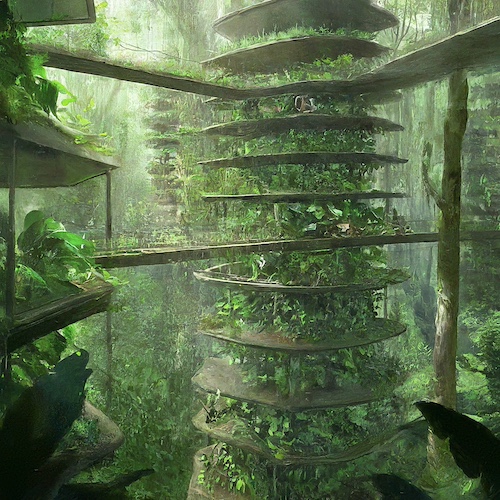Rainforest Canopy Farms for Cameroon
Rainforest Canopy Farms: A Sustainable Oasis High Above the Trees
Imagine a vibrant tapestry of life suspended within the emerald embrace of the Cameroonian rainforest. This is the vision of Rainforest Canopy Farms, a futuristic marvel that utilises the rainforest itself to create a sustainable agricultural haven.
Design and Setup:
Modular Vertical Farms: Lightweight, prefabricated modules are constructed from sustainable materials and hoisted into the rainforest canopy.
Suspended Walkways: A network of secure walkways connects the modules, allowing for access, maintenance, and transportation of produce.
Rainwater Harvesting: Sophisticated systems capture rainwater from the rainforest canopy, providing a natural irrigation source for the farms.
Waste Management Integration: Composting systems within each module convert organic waste (food scraps, plant trimmings) into nutrient-rich fertiliser, minimising waste and maximising resource efficiency.
Utilising the Rainforest:
- Natural Light Filtration: The canopy provides a perfect filter for sunlight, creating ideal growing conditions for shade-loving plants like mushrooms and leafy greens.
- Habitat Preservation: By minimising deforestation for traditional agriculture, these farms preserve the biodiversity and ecological functions of the rainforest.
Turning Waste into Resources:
- Closed-Loop System: The integration of composting systems ensures a closed-loop system, minimising waste and maximising resource utilisation.
- Biogas Potential: Future advancements could see the implementation of biogas digesters that convert organic waste into biogas, providing a renewable energy source for the farms.
Challenges and Solutions:
- Initial Investment: Setting up the infrastructure for Rainforest Canopy Farms requires a significant initial investment. Potential solutions include public-private partnerships and innovative financing models.
- Accessibility and Maintenance: Maintaining these high-altitude farms requires specialised equipment and training. Utilising drones for inspections and incorporating modular designs for easier repairs can address these challenges.
- Biodiversity Integration: Careful planning is required to ensure the farms do not disrupt existing rainforest ecosystems. Studies and collaboration with local communities are crucial for a sustainable approach.
Future Environmental Benefits:
- Reduced Deforestation: By providing a sustainable source of food production, Rainforest Canopy Farms can help reduce the need to clear rainforest land for traditional agriculture.
- Enhanced Biodiversity: Preserving the rainforest canopy protects the habitat of countless species, promoting a healthy and diverse ecosystem.
- Climate Change Mitigation: Rainforests act as carbon sinks, and by minimising deforestation, these farms contribute to mitigating climate change.
DIY Inspiration (Small and Large Scale):
- Small Scale: Create a vertical garden on your balcony or patio, utilising recycled materials and organic waste for composting.
- Large Scale: Community gardens can adopt vertical farming techniques and implement composting systems to promote sustainability.
A Sustainable Future:
Rainforest Canopy Farms offer a glimpse into a future where innovation and environmental responsibility intertwine. By harnessing the power of the rainforest itself, these futuristic gardens can create a more sustainable future for Cameroon, ensuring food security, biodiversity preservation, and a thriving ecosystem for generations to come.




